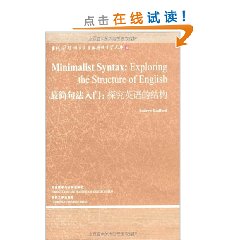 最簡句法入門
最簡句法入門內容簡介
《最簡句法入門:探究英語的結構》清晰,詳盡地介紹了建立在喬姆斯基最簡方案理論基礎上的一些最新句法理論。作為句法學理論和英語句法教材,《最簡句法入門:探究英語的結構》內容豐富、由淺入深、可讀性強,每章結束後都配有練習題供學生深入分析英語短語及名子,書中還提供了一個內容豐富的術語辭彙表。即便是對句法理論了解不的讀者亦可使用《最簡句法入門:探究英語的結構》。
作者簡介
作者:(英國)AndrewRadford
目錄
lGrammar
1.1 0verview
1.2 Traditional grammar
1.3 Universal Grammar
1.4 The Language Faculty
1.5 Principles of Universal Grammar
1.6 Parameters
1.7 Parameter—setting
1.8 Evidence used to set parameters
1.9 Summary
Workbook section
2 WOrds
2.1 Overview
2.2 Grammatical categories
2.3 Categorising words
2.4 Functional categories
2.5 Determiners and quantifiers
2.6 Pronouns
2.7 Auxiliaries
2.8 lnfinitival to
2.9 Complementisers
2.10 LabelledBracketing
2.11 Grammatical features
2.12 Summary
Workbook section
3 Structure
3.1 CIverview
3.2 Phrases
3.3 Clauses
3.4 Specifiers
3.5 Intermediate and maximal projections
3.6 Testing structure
3.7 Syntactic relations
3.8 Bare phrase structure
4 Null constituents
4.1 Overview
4.2 Null subjects
4.3 Null auxiliaries
4.4 Null T in auxiliarilessfiniteclauses
4.5 Null T in bareinfinitiveclauses
4.6 Null C in finite clauses
4.7 Null C in non—finite clauses
4.8 Defective clauses
4.9 Case properties of subjects
4.10 Null determiners
4.11 Summary
Workbook section
5 Head movement
5.1 Overview
5.2 T—TO—C movement
5.3 Movement as copying and deletion
5.4 V—TO—T movement
5.5 Head movement
5.6 Auxiliary raising
5.7 Another look at negation
5.8 DO—support
5.9 Head movement in nominals
5.10 Summary
Workbook section
6 Wh-movement
6.1 Overview
6.2 Wh—questions
6.3 Wh—movement as a copying operation
6.4 Wh—movement.EPP and the Attract Closest Principle
6.5 Explaining what moves where
6.6 Wh—subject questions
6.7 Pied—piping
6.8 Yes—no questions
6.9 Wh—exclamatives
6.10 Relative clauses
6.11 That—relatives
6.12 Summary
WOrk book section
7 A-movement
7.1 Overview
7.2 Subjects in Belfast English
7.3 Quotatives and idioms
7.4 Argument structure
7.5Thematicroles
7.6 Unaccusativepredicates
7.7 Passive predicates
7.8 Long—distance passivisation
7.9 Raising
7 10 Comparing raising and control predicates
7.11 Summary
Work book section
8 Agreement,case and movement
8.1 Overview
8.2 Agreement
8.3 Feature valuation
8.4 Uninterpretable features and feature—deletion
8.5 Expletive it subjects
8.6 Expletive there subjects
8.7 Agreement and A—movement
8.8 EPP in control infinitives
8.9 EPP in other infinitives
8.10 Summary
Work book section
9 Split projections
9.1 Overview
9.2 Split CP:Force.Topic and Focus projections
9.3 Split CP:Finiteness projection
9.4 Split VPs:VP shells in ergative structures
9.5 VP shells in resultative.double—object and object—control
structures
9.6 VP shells in transitive,unergative,unaccusative,raising andlocativeinversion structures
9.7 Transitive light verbs and accusative case assignment
9.8 Evidence for a further projection in transitive verb phrases
9.9 Extending the shell analysis tO nominals
9.10 Summary
Work book section
10 Phases
10 1 Overview
10.2 Phases
l0.3intransitiveand defective clauses
l0.4 Wh—movement through spec—CP
l0.5 Wh—movement through spec—vP in transitive clauses
l0.6 Evidence for successive—cyclic wh—movement throughspec—CP
10.7 Evidence for wh—movement through spec—vP in transitive clauses
10.8 The role of phases in Lexical selection
10.9 Questions about phases
l0.10 The nature of A—bar movement
10.11 Summary
Work book section
Glossart and list ofabbreviations
References
Index
